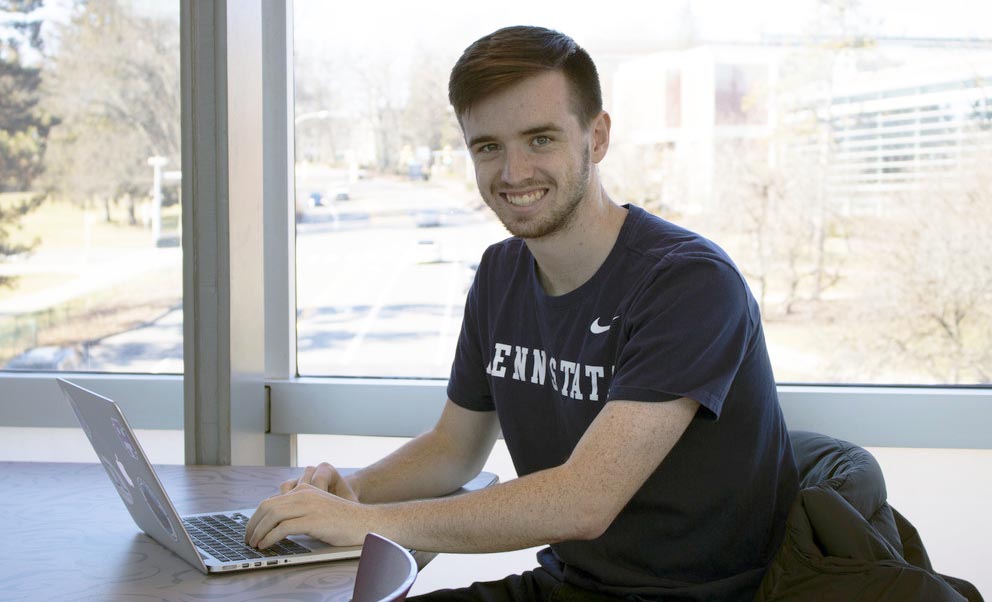
Computational data sciences and mathematics major Kyle Bradley is using simulated radar data to predict and measure severe thunderstorms. IMAGE: JEFF RICE
Schreyer Honors Scholar applies neural networks to better predict severe storms
3/2/2020
By Jeff Rice
UNIVERSITY PARK, Pa. — Kyle Bradley’s introduction to research at Penn State came during the summer after his sophomore year, when he took a job at the Applied Research Lab. His first project used sensor data to better determine when unplanned maintenance events on Navy ships might occur, potentially saving time and money, or even improving travel routes.
Today, the Schreyer Honors Scholar is working on a research project that could similarly predict trouble and allow people to better plan for it. As part of his honors thesis, Bradley is using machine learning to predict the projected paths and arrival times of serious thunderstorms and tornadoes.
“What I’m working on currently is trying to detect storms within simulated data,” said Bradley, a double major in computational data sciences, which is housed in the School of Electrical Engineering and Computer Science, and mathematics. “That would increase the amount of preparation time for reacting to a storm. If you’re able to find it in the simulated data in 24 hours, you might be able to then do something about it.”
Working with the guidance of Penn State Professor of Information Sciences and Technology James Wang and graduate student Xinye Zheng, Bradley is analyzing two sets of weather data. The first is radar data of the central United States, where quickly changing thunderstorm events are frequent. The second set is simulated radar data that projects what storms might do over the next 48 hours.
“Within the simulated data, it’s a little messier, because there’s random noise,” he said. “In real life, the storms follow a pretty similar pattern to how they are actually constructed.
“There are some common patterns that the storms form in. In the real data, the patterns that are understood about the storms are based on real clouds. The patterns kind of are the same from both, but they get a little disjointed or not as exactly formed in the simulated data. It’s still using the same general idea. You just have to dig a little deeper into abstracting the shape of the storm rather than just taking it more at face value.”
Bradley, who said he was afraid of and fascinated by thunderstorms as a young child, was intrigued by the research possibilities the Schreyer Honors College offered. He took a class with Wang in his junior year and liked that it was project-based, and found the professor’s research on weather intriguing, which is why he reached out to him when it came time to choose a thesis topic. He also liked the idea of applying data science, which seeks to tackle uncertainty, to an uncertain activity like weather forecasting.
“Coming into college, I didn’t know anything about how research was done,” said Bradley, who also credits his involvement with Nittany Data Labs with increasing his interest in data science. “Dr. Wang and my other professors have given me a lot of advice, not only about my specific thesis, just about general career and life advice of how I should think about my different options and best chase what I’m after in industry.”
After graduating in May, Bradley plans to pursue career opportunities that allow him to use machine learning and creatively solve problems.
“There’s such a wealth of data out there that you can find a place to provide value anywhere you are,” he said. “I think I would be more interested in working somewhere where they’re really emphasizing the ability to utilize their data and trying to derive value out of it. That would be the most important thing to me.”
About the Schreyer Honors College
The Schreyer Honors College promotes academic excellence with integrity, the building of a global perspective, and creation of opportunities for leadership and civic engagement. Schreyer Honors Scholars total approximately 2,000 students at University Park and 20 Commonwealth Campuses and represent 38 states and 28 countries. More than 14,000 scholars have graduated with honors from Penn State since 1980.



